Quiz: Is the remote control suitable for you (not freelance!)?
This article is for those who think about whether to try remote work, and weighs the risks: the lifestyle will change significantly, you never know what will go wrong, and it will not be easy to return. I will not present the remote as a heavenly delight on a beach under a palm tree. Such articles have already been written enough, and they do not help to decide. I will try to help with the answer to exactly one question: “How can I find out with minimal risks whether it is suitable for you?”.
In this formulation, half the answer is already laid. There is only one way to find out if something suits you personally - an experiment. I was able to experiment in controlled conditions - without changing jobs. As a result, I liked working from home, and I don’t want to go to the office. But my friend from home does not work at all - everything is individually. But the approach to experimentation does not change.
So, the joys and bad things are removed and the transition period. Retrospective personal experience, and in the end - a small test, it’s also an experiment plan.
')

(carefully, a lot of pictures)
First of all, we agree on terms. As part of my story: remoteness - work exclusively in the specialty on exactly one employer .
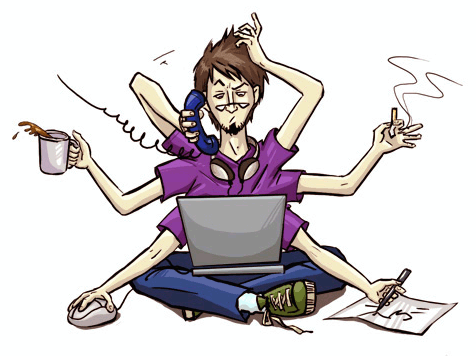
Freelance (as far as I can see from the couch) is a completely different level of heroism that requires combining heaps of roles: look for customers, make up TK, solve user problems, manage accounts, etc.
Many of my observations are true for freelancing, but this is better to read in the original source .
Is it possible to try a remote job or something close to it so that you can quickly get it back if you don't like it? There is no reliable recipe for everyone. But here are some approaches you can try.

The paradoxical move is not to drag work closer to home, but to get home closer to work. You can rent an apartment next to the work - in the next house. The option is good because you do not need to coordinate anything with the authorities. Personally, it came out to me sideways, regularly ran home: the washing machine broke, or my wife missed.

You can simply tell your superiors at the current job that you want to try a remote job. It happens, it works. You can try to negotiate informally, only with the immediate superior.
Even if the agreement did not work out, you received important information. Perhaps the reason for the refusal is a lack of trust in the team or you personally, and it will be useful to know about it.
My “just asking” didn't work. In general, an adequate boss could not explain why it is impossible to work from home. Yes, and senior management insisted on being in the office.
They are not allowed to permanent - you can agree to work from home sometimes. This may not be allowed, because the business processes in the company are not adapted - it is banal that the VPN is not provided, or you need to be physically present at general meetings.
For two months I purposely brought my wife to the diagnosis under the cover of darkness.
Brought:
Because my wife needed supervision, he asked the management for a month of work from home. Nobody bothered to remember the end date, so in fact, he worked like this for two months. Then he verbally agreed with the immediate superiors that I would continue to work this way. By that time, I already had an argument: the performance remained the same. Later I got a job in a company where remote operation is the main one.

Sometimes fate itself puts the circumstances for you. It remains only to see how to use them. For example, in that year, in my hometown, one of the shopping centers was closed for two weeks as a fire hazard, so that the employees of the local offices were forced to test drive the remote. I liked, by the way, not all.
Or you can get to the team, where the presence in the office or work from home does not require coordination. Also a good chance to test your capabilities.
Go to the spoilers - what to prepare for. It will seem to someone that the text below is written in close cooperation with Captain Obvious. Indeed, I will not say anything supernatural. There was no task “to surprise”, there was a task “to describe the prose of life as it is”.
Treat the following as a checklist, subjective and incomplete: check what is causing you questions, enthusiasm or internal protest. This will help you decide.
In the office, the workplace is the responsibility of the employer. You come to a ready-made computer / table / chair. If the wheel breaks or the hard drive crashes, the employer takes care of the replacement while you are legally chasing tea in the kitchen. On the remote only you are responsible for your tools.
I collected my working corner from scratch, and it cost me about 120k (makovods, multiply by at least 2), of which the current employer - “Maxillect” - compensated for about 60k (without details, not to be considered advertising; who is interested - ask in comments).
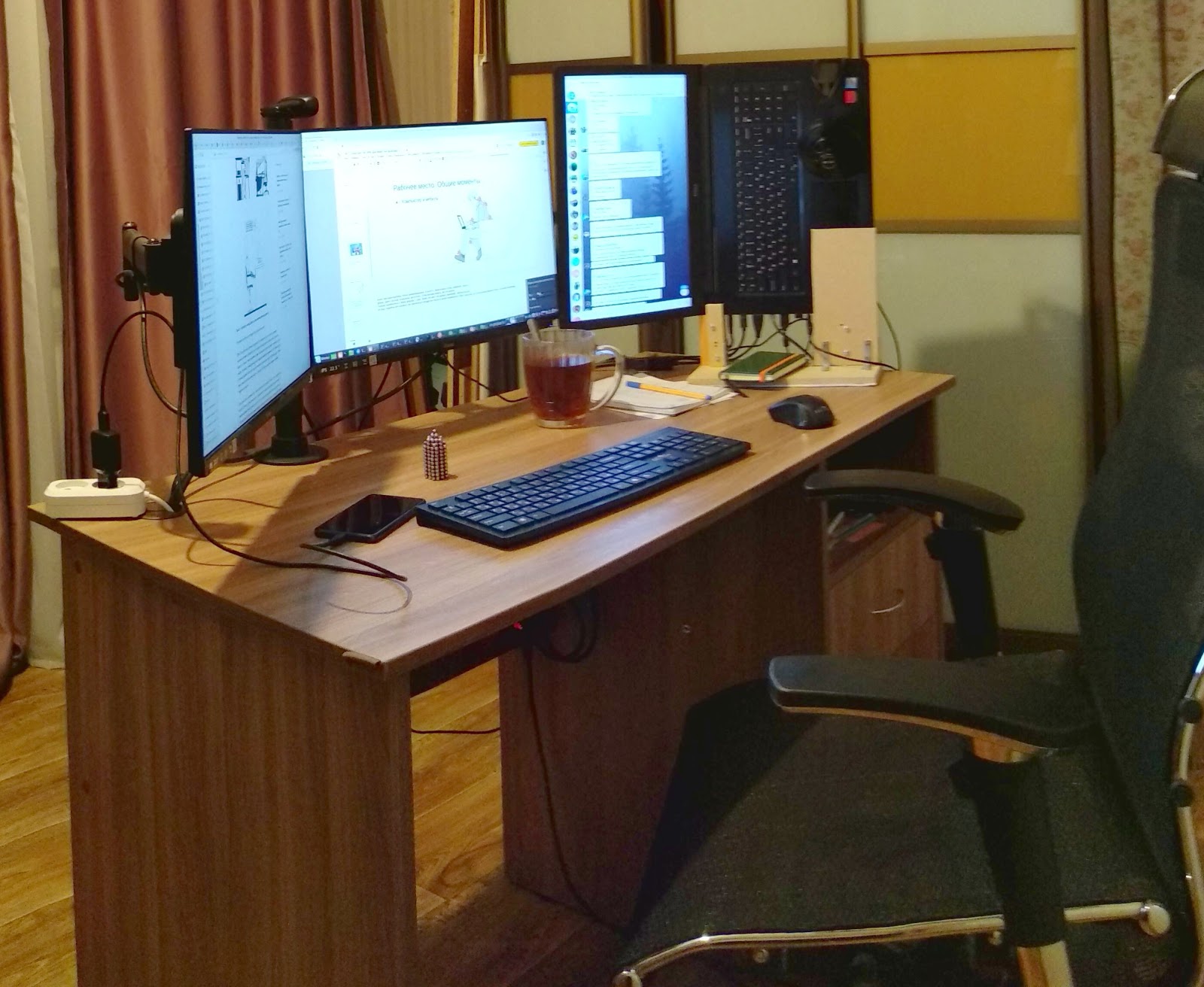
Not all costs will be so capital. Many already have a powerful gaming computer and a good monitor - this is the most expensive part, the rest is much less.
The main advantage is that the choice is yours. Everything can be perfectly chosen: standing table, knee chair, any exotic.
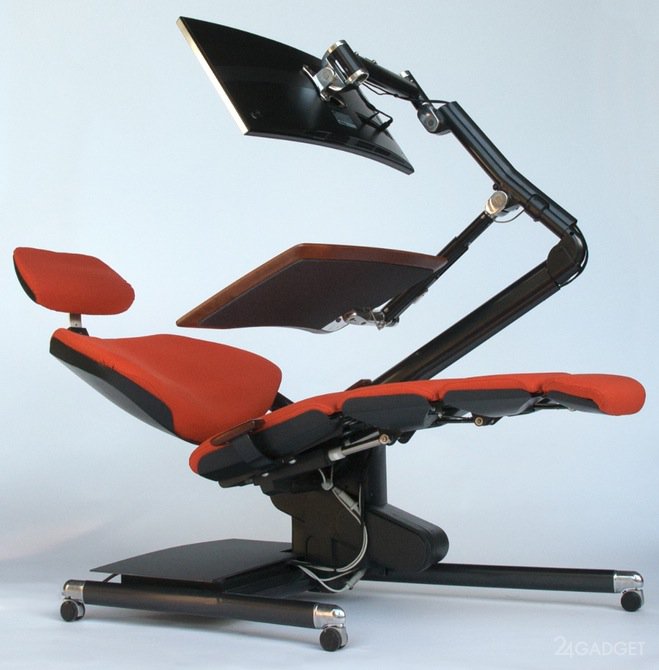
Up to the most fierce game.
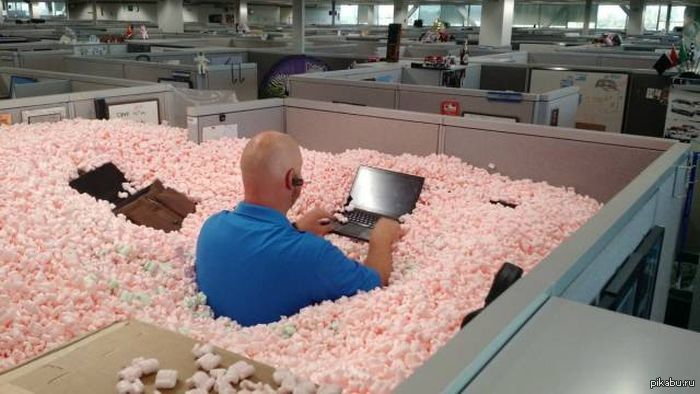
I remember someone (on Habré?) Described how he worked at a computer while lying in a bathroom with water.
The table can always be put as psychologically more comfortable: closer to the window, away from the window, back to the wall, to the forest in front.

In general, a workplace is more than an armchair and a table with a working computer. This should include everything that is needed for productive work. Much of this is not noticed at all until you lose it.
A desk, an armchair, a computer, a pair of monitors, a webcam and a headset for communication. Even if the employer organizes a thin client farm, some iron will still be needed. You can do with a laptop and a stool a maximum of a day or two.
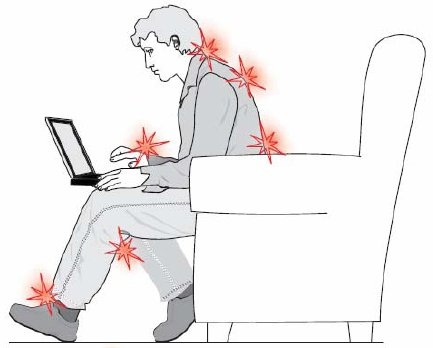
If you have to work remotely longer, I recommend once in a lifetime to read about the correct fit at the computer. Spoiler: leaking under the table - the wrong fit. It is not necessary to save on the chair, it is more expensive to treat the back afterwards. But the table can be put the most simple, if only the table top is suitable in height.

In the name of fault tolerance, it is better to have two important things: spare internet (at least from a mobile phone), backup power (ideally for a router, and for provider equipment at the entrance), backups of the working environment - important data, software with settings. Aerobatics - spare working comp. On the remote you are your own IT service.

Without ventilation, carbon dioxide quickly accumulates in the room, begins to tend to sleep or headache. Poor lighting - an extra strain on the eyes. In the cold and the heat to work, too, will not work. Air conditioner and battery dry the air, dry mucous membranes of the mouth and nose - hello, SARS. Dry eyes are also no good, as is the increased humidity. All these parameters will have to take care of yourself.

Neither neighbor's chatter in openspace nor screaming baby at home helps to concentrate. Well, if you know how to abstract. Do not go to abstract - isolate yourself: on the balcony, in the office with the latch on the door, in co-working.

On the remote there will be less reasons for movement. Need self-discipline to do fitness. Pool, by the way, helps a lot to fix (and prevent!) Back problems. Take care of your health yourself. Nobody will do that for you, maximum - fitness will be paid. At least learn the basics, articles on the Internet enough.
An employee and an employer with a remote work format are not required to be in the same city. From this fact we have three main consequences.
On the expanses of the globe somewhere yes there is your dream job. This is especially true for small settlements where there is almost no place to work. For residents of cities with over a million, there are buns too. You can find an offer with an income level somewhere in the middle between local and metropolitan salary. It is possible to enter the foreign market - yes, there are more difficulties there, but revenues are also higher.
You can change the city and even the country, without changing the place of work and not bothering with any approvals. In a typical article about remote and freelance, the first illustration is a man with a laptop on the shore of a tropical ocean. Theoretically, you can really work under palm trees. Only you need to understand which word is key in the phrase “work under palm trees”. Hint: these are not “palm trees”.

Actually the key word is “ work ”. Imagine: the Cote d'Azur, the gentle breeze, the tanned people in bathing suits in every possible way get high, and you sit and stare at the monitor.
It is fair to say that it is realistic to rent a bungalow somewhere in the tropics near the coast, deploy a sane workplace there and, as expected, work 45 minutes, 15 minutes to splash around in the ocean. Without depressing thoughts that the vacation ends, the day after tomorrow the plane is back, and the weather turned bad and is not going to be corrected.
Speaking of time trouble. Suppose you want to go on vacation to another city to see. How does it usually look like?

For two weeks at a gallop across Europe, the roof travels from an overdose of impressions and the density of the schedule. And on the remote, you can slowly fill up your eyes.
For example, I was with my wife for three weeks in St. Petersburg on a business trip. And during these three weeks we only got a taste. If I were a remote operator, I would rent an apartment for a couple of months and would penetrate the city as it should, and not as anything.
The proximity of work and home can be called bagofich. This is both the biggest advantage of the remote and the toughest stop factor.
Immediately, I would like to say that I consider work from home as the main option, and work from the office or co-planning next to the house as spare. The office has only one advantage over the house, albeit an important one: it's easier not to be distracted by household members and the contents of the refrigerator. The rest is better at home. So I would think about renting an office only if it’s impossible to work from home.
Work from home (or from the office near the house) gives a large pile of small amenities. Here is an incomplete list of reasons invented in a minute:
But the fee for all these pleasures worthy of a separate chapter.
Traditional office mode provides isolation of life and work "out of the box": you can not be both at home and at work (although science and technology are working on it). At home you will have to watch yourself so that work and life do not interfere with each other.

The working comp should be yours personally. You do not wait until he is free. Do not shake that important files will be erased or vir is picked up. When you need to work, the computer must be ready.
A long time ago, in the first year of living together, my wife and I had one laptop for two. The battles for him were serious. Then I decided for myself that the computers / laptops should be no less than adult family members.

It is vitally important for the spouse to realize that working requires long intervals without interruption. Sounds easy, right? It seems that it’s enough just to explain once, because adults are reasonable enough.
What a delusion! If you personally were lucky and one explanation was enough, immediately place a monument to your partner. It is possible that it will take many months to teach (no, this is not an exaggeration).
And then there are children who at different ages in different ways resist everything that robs them of your every second attention. In 99.9% of cases, parental hardness works, but not all are capable of showing this hardness.
This item - the main stop factor when working from home, take it seriously. Either you seek understanding from the household (explanations, persuasion, growl), or you are locked in a separate room, or you cannot work from home at all.
Everyone sometimes needs loneliness, someone more, someone less. If both spouses are constantly at home (both remote workers or a housewife), there may be problems with personal space.
You will probably think: “We are the perfect couple, this is definitely not about us.” May be. And it may also be that after a few months you will start looking for reasons to leave the house or send a partner for a walk. And the cherry on the cake - to be driven into, that they tied life to the wrong person, since you want to be without him.
So, the need to be alone with yourself - absolutely normal thing. Regardless of the compatibility of the spouses, they sometimes need to rest from each other. It is enough to go to different rooms, and it is not enough.
The working solution is to secure an activity separate from the partner, at least periodically. Suitable personal hobbies or forays with friends without the second half.
The main meanness of this item is in gradualism. The lack of privacy accumulates little by little and may not be felt immediately. The required dose of loneliness will have to figure out for quite some time. It is worth at least roughly estimate it during a test drive udalenki.
Of course, the office provides more opportunities for communication and socialization. As in the case of a workplace, some things that are important for productivity are easily overlooked, because “it works by itself”, without conscious effort on your part.
In the office, you have a channel for free that allows you to transmit your voice, picture, mimicry, gestures, and even kick your colleague, because of which production fell yesterday. And this channel is broadcast (except for kicks).

Obvious applications are to discuss a working task with a cooler or to draw together at the blackboard. Less obvious examples - just sitting in the office, you can catch the edge of it, than colleagues and company breathe. Even through this channel, the management monitors the morale of employees, sometimes noticing professional burnout before the burnout itself.
On the remote, you still need to share knowledge, receive news and monitor the vigor of people, including their own. But this magic channel is not there, but with technology it is only partially replaced. What has not mastered the technique, will have to take over, putting conscious organized efforts.
And mastered the technique is not so much.
The main channel of communication is still text. It is preserved, and this is a great advantage: the text can be re-read, sent in unchanged form, put into the article in the knowledge base (instead of pronouncing one and the same thing a hundred times). The text allows for a thorough discussion of several people. But it is still not enough.
They learned how to transmit sound, but they switch to it only when it is necessary to explain something quickly, and to print is lazy. The picture is worse - crashes, delays, camera control is still not there. Very bad with the transfer of kicks and other tactile sensations - all hope for the development of the porn industry .
Findings?

The remote worker should make a conscious effort to transmit the very non-verbal signals that we use to exchange mood in a personal conversation, in an explicit form. In particular:
For example, if you feel that the project you zadolbal, it is worth discussing it with the authorities as soon as possible. Seriously, transparency is important even in the office. And on udalenke especially.
An office is, among other things, an exit “to people”, a reason, at least, to put on pants and remember how to say “hello”. Accordingly, the remote is more or less wild.

Owners of meter sewing in the fifth point have nothing to worry about: they are not threatened with savagery. Closed singles, too, have nothing to worry about: a decrease in the number of contacts is a joy to them. If you do not belong to any of these extremes, you should think about two things.
First, what to do? In addition to meetings with friends and some hobbies, there are also virtual chatters, volunteering, open-source.
Secondly, with whom? On the remote it will not work to close the positions of a “colleague” and a “drinking buddy” by one person.
And so that the team does not become overgrown savages, communicating among themselves with SQL queries, daily team video calls are sufficient.
The employer in different ways controls the working time in the office and on the remote. Theoretically, remote control methods are applicable to office workers. But these methods require great effort from management. So, business processes are significantly different, although there are some similarities, of course. The office, with its magical nonverbalic transmission channel, allows the manager to maximize the use of soft skills. Remote control is more formalized, but more focused on what you really need to measure.

On average, you can expect that the work schedule will be very flexible, since the number of working hours does not directly affect your efficiency. The main thing, of course, is not to abuse and be in touch with colleagues when it is needed: on regular calls, when distributing tasks, when you need to share knowledge, etc.
I had to work in a couple of offices, where they demanded to come to work by 9 am (although, in my opinion, for IT this is nonsense). On the remote, I can hardly imagine this.
It was necessary to install all kinds of instant messengers, VPN-client, terminal, postgres client and, sitting somewhere in the bank or tax, to look into the task tracker and the build system, restart the attachment on the stand and poke around in the database. And sometimes code until dawn (voluntarily).

A simple and effective remedy for procrastination and savagery. If you look at the seals in YouTube, the question will begin to itch in your head: “What am I going to tell you about the status tomorrow?”.

The reasonable minimum of the bureaucracy, which is necessary not only for the employer, but also for the employee, in order not to slip into workaholism.
Work should be given exactly as much time as needed. There are distortions in both directions - and work from waking up to falling asleep, and the complete inability to concentrate at home.
Moreover, workaholism in the long run beats productivity not worse than procrastination. Even if your colleagues are a family, this is not a reason to systematically recycle. In the end, the leadership does not need your burnout. In the office, an adequate boss will chase you home when you have earned money. At the same remote on this must be monitored independently.
Only self-discipline will save here. It should be borne in mind that in the office the work itself does not take all 8 hours. In addition to lunch and toilet breaks, for long-term productivity, it is also necessary to switch to YouTube seals in YouTube - of course. Any manager who knows how to do that.
Do not understand the 8-hour working day too literally. 8 hours of work “clean” is the equivalent of 12-15 hours in the office. Such workaholism, I repeat, no one needs. A specialist of intellectual work for a week can do work for about 20 hours. The work week can be increased, but the amount of work done from this will not increase.
If the place of sleep and place of work in the same room, then at least wear pants (really works; the trick is overlooked in the training manual published by Forbes with the support of Microsoft). The ideal, of course, is a separate office to change the situation, switching from rest to work and vice versa.
The chief does not stand above the soul and does not look at the monitor. However, do not give in to the feeling that nobody is measuring your productivity.
Adequate administration monitors mainly the amount of work done. Control freaks are forced to use a time tracker. In any case, there may be no sensation of supervision, but there is supervision itself.

Time Tracker - spyware software that takes screenshots every 15 minutes, can record webcam video, browser history and Cthulhu knows what else.
Such control is somehow justified on the freelance exchanges, where the customer does not trust the performer, because not familiar with it. In a long relationship, I am sure he is doing more harm, helping only to quench his thirst for control. What prevents the employee to put next to the second laptop and twist it kinoshku or YouTube with cats?
Control-frieness is a characteristic, rather, of the company as a whole. For example, she has kept offices all her life and tries to copy the corresponding business process to remote workers. Or copies the approach to freelancers. Or the manager may be trite too lazy to think what to measure and how to measure, because the old approach somehow worked “on sensations” and did not require conscious effort. Personal cockroaches and complexes, including top management, are not excluded.
In addition, I came across a paranoia about root-rights on employee’s devices (a worker laptop, a rudimentary “Android”). Actually saw how the developers were deprived of admin rights and seriously discussed the setting of office Wi-Fi, to prohibit the connection of the rooted “Androids”. To my taste, all this is not only unpleasant, but also testifies to the immaturity of the company or individual managers. You need to find out at the interview and stay away from such employers.
Toward the close - a few tips in case you decide to change jobs to a remote one.
To choose an adequate employer, it will be useful to understand why companies are looking for remote workers. In addition to the control freaks, it is worthwhile to cut off at the interview stage those who are trying to squeeze you for money. For example, according to the principle “for ZP Joon in Moscow, you can hire a signor in the province”. Or a more sophisticated variation: “Okay, we will pay as a middle, and we will be burdened with duties like PMU”. Another such logic occurs: “we give a lot of freedoms, and therefore we will pay less money”. In all these cases, the company aims not to cooperate, but to muhlezh or squeezing juices. Such a minus can hardly be compensated by anything.

So, what udalenka gives a normal employer?
In general, there is no problem with remote work search. There are enough jobs, there are appropriate filters on job search sites. In the end, come to work with us at Maxillect.
And now - actually, the test. Let's briefly go over the most likely stop factors.
To fully answer all the questions, you will need an experiment - how to organize it, I told in the “Demo version” section. For a couple of weeks you can get an idea how much work to do on yourself. If at least one question you answered "no", probably, the remote will bring you only disappointment.
Questions below.
Update: according to the recommendation from the comments, the multi-questions were divided.
The author of the article: Kirill Gamazkov, “Maxilekt” timlid ( vokzamag )
The text was prepared based on the speech of Cyril on Samara Java and Kotlin User Groups Meetup March.
PS We publish our articles on several sites Runet. Subscribe to our pages on the VK , FB or Telegram channel to find out about all our publications and other news from Maxilect.
In this formulation, half the answer is already laid. There is only one way to find out if something suits you personally - an experiment. I was able to experiment in controlled conditions - without changing jobs. As a result, I liked working from home, and I don’t want to go to the office. But my friend from home does not work at all - everything is individually. But the approach to experimentation does not change.
So, the joys and bad things are removed and the transition period. Retrospective personal experience, and in the end - a small test, it’s also an experiment plan.
')

(carefully, a lot of pictures)
Another look at the remote in our blog:
- How I moved ... home, or my answer to the author of the article about the "merciless meal" - as one of our employees after working in St. Petersburg returned to his native Krasnoyarsk;
- People and processes: why the remote is not suitable for every company? - Against the background of enthusiasm from the remote site, there is regularly news that another large company has turned off this experiment. We understand why;
- I am looking for a senior without an office and cookies: how we have organized a search for employees at 100% remoteness - an interview with the general director about how hiring remote employees is built in Maxilect;
- How we control remote employees - why the Maxilect does not use presence monitoring tools and automated time tracking systems;
- The transition from the office to the remote: share experiences and life hacking - a collective look at the transition process in the eyes of the team.
- How I moved ... home, or my answer to the author of the article about the "merciless meal" - as one of our employees after working in St. Petersburg returned to his native Krasnoyarsk;
- People and processes: why the remote is not suitable for every company? - Against the background of enthusiasm from the remote site, there is regularly news that another large company has turned off this experiment. We understand why;
- I am looking for a senior without an office and cookies: how we have organized a search for employees at 100% remoteness - an interview with the general director about how hiring remote employees is built in Maxilect;
- How we control remote employees - why the Maxilect does not use presence monitoring tools and automated time tracking systems;
- The transition from the office to the remote: share experiences and life hacking - a collective look at the transition process in the eyes of the team.
First of all, we agree on terms. As part of my story: remoteness - work exclusively in the specialty on exactly one employer .

Freelance (as far as I can see from the couch) is a completely different level of heroism that requires combining heaps of roles: look for customers, make up TK, solve user problems, manage accounts, etc.
Many of my observations are true for freelancing, but this is better to read in the original source .
Demo version of the remote
Is it possible to try a remote job or something close to it so that you can quickly get it back if you don't like it? There is no reliable recipe for everyone. But here are some approaches you can try.
Home next to work

The paradoxical move is not to drag work closer to home, but to get home closer to work. You can rent an apartment next to the work - in the next house. The option is good because you do not need to coordinate anything with the authorities. Personally, it came out to me sideways, regularly ran home: the washing machine broke, or my wife missed.
Just ask

You can simply tell your superiors at the current job that you want to try a remote job. It happens, it works. You can try to negotiate informally, only with the immediate superior.
Even if the agreement did not work out, you received important information. Perhaps the reason for the refusal is a lack of trust in the team or you personally, and it will be useful to know about it.
My “just asking” didn't work. In general, an adequate boss could not explain why it is impossible to work from home. Yes, and senior management insisted on being in the office.
Episodically
They are not allowed to permanent - you can agree to work from home sometimes. This may not be allowed, because the business processes in the company are not adapted - it is banal that the VPN is not provided, or you need to be physically present at general meetings.
Caring for a relative as a reason
For two months I purposely brought my wife to the diagnosis under the cover of darkness.
Brought:
Z34.0 according to ICD-10

Because my wife needed supervision, he asked the management for a month of work from home. Nobody bothered to remember the end date, so in fact, he worked like this for two months. Then he verbally agreed with the immediate superiors that I would continue to work this way. By that time, I already had an argument: the performance remained the same. Later I got a job in a company where remote operation is the main one.
Seize the moment

Sometimes fate itself puts the circumstances for you. It remains only to see how to use them. For example, in that year, in my hometown, one of the shopping centers was closed for two weeks as a fire hazard, so that the employees of the local offices were forced to test drive the remote. I liked, by the way, not all.
Or you can get to the team, where the presence in the office or work from home does not require coordination. Also a good chance to test your capabilities.
What awaits you on the remote?
Go to the spoilers - what to prepare for. It will seem to someone that the text below is written in close cooperation with Captain Obvious. Indeed, I will not say anything supernatural. There was no task “to surprise”, there was a task “to describe the prose of life as it is”.
Treat the following as a checklist, subjective and incomplete: check what is causing you questions, enthusiasm or internal protest. This will help you decide.
Workplace
In the office, the workplace is the responsibility of the employer. You come to a ready-made computer / table / chair. If the wheel breaks or the hard drive crashes, the employer takes care of the replacement while you are legally chasing tea in the kitchen. On the remote only you are responsible for your tools.
I collected my working corner from scratch, and it cost me about 120k (makovods, multiply by at least 2), of which the current employer - “Maxillect” - compensated for about 60k (without details, not to be considered advertising; who is interested - ask in comments).

Not all costs will be so capital. Many already have a powerful gaming computer and a good monitor - this is the most expensive part, the rest is much less.
The main advantage is that the choice is yours. Everything can be perfectly chosen: standing table, knee chair, any exotic.

Up to the most fierce game.

I remember someone (on Habré?) Described how he worked at a computer while lying in a bathroom with water.
The table can always be put as psychologically more comfortable: closer to the window, away from the window, back to the wall, to the forest in front.

In general, a workplace is more than an armchair and a table with a working computer. This should include everything that is needed for productive work. Much of this is not noticed at all until you lose it.
Appliances and furniture
A desk, an armchair, a computer, a pair of monitors, a webcam and a headset for communication. Even if the employer organizes a thin client farm, some iron will still be needed. You can do with a laptop and a stool a maximum of a day or two.

If you have to work remotely longer, I recommend once in a lifetime to read about the correct fit at the computer. Spoiler: leaking under the table - the wrong fit. It is not necessary to save on the chair, it is more expensive to treat the back afterwards. But the table can be put the most simple, if only the table top is suitable in height.
Reservation

In the name of fault tolerance, it is better to have two important things: spare internet (at least from a mobile phone), backup power (ideally for a router, and for provider equipment at the entrance), backups of the working environment - important data, software with settings. Aerobatics - spare working comp. On the remote you are your own IT service.
Light and climate

Without ventilation, carbon dioxide quickly accumulates in the room, begins to tend to sleep or headache. Poor lighting - an extra strain on the eyes. In the cold and the heat to work, too, will not work. Air conditioner and battery dry the air, dry mucous membranes of the mouth and nose - hello, SARS. Dry eyes are also no good, as is the increased humidity. All these parameters will have to take care of yourself.
Privacy

Neither neighbor's chatter in openspace nor screaming baby at home helps to concentrate. Well, if you know how to abstract. Do not go to abstract - isolate yourself: on the balcony, in the office with the latch on the door, in co-working.
Health

On the remote there will be less reasons for movement. Need self-discipline to do fitness. Pool, by the way, helps a lot to fix (and prevent!) Back problems. Take care of your health yourself. Nobody will do that for you, maximum - fitness will be paid. At least learn the basics, articles on the Internet enough.
Geographical decoupling
An employee and an employer with a remote work format are not required to be in the same city. From this fact we have three main consequences.
Wider choice
On the expanses of the globe somewhere yes there is your dream job. This is especially true for small settlements where there is almost no place to work. For residents of cities with over a million, there are buns too. You can find an offer with an income level somewhere in the middle between local and metropolitan salary. It is possible to enter the foreign market - yes, there are more difficulties there, but revenues are also higher.
Freedom of movement
You can change the city and even the country, without changing the place of work and not bothering with any approvals. In a typical article about remote and freelance, the first illustration is a man with a laptop on the shore of a tropical ocean. Theoretically, you can really work under palm trees. Only you need to understand which word is key in the phrase “work under palm trees”. Hint: these are not “palm trees”.

Actually the key word is “ work ”. Imagine: the Cote d'Azur, the gentle breeze, the tanned people in bathing suits in every possible way get high, and you sit and stare at the monitor.
It is fair to say that it is realistic to rent a bungalow somewhere in the tropics near the coast, deploy a sane workplace there and, as expected, work 45 minutes, 15 minutes to splash around in the ocean. Without depressing thoughts that the vacation ends, the day after tomorrow the plane is back, and the weather turned bad and is not going to be corrected.
Speaking of time trouble. Suppose you want to go on vacation to another city to see. How does it usually look like?

For two weeks at a gallop across Europe, the roof travels from an overdose of impressions and the density of the schedule. And on the remote, you can slowly fill up your eyes.
For example, I was with my wife for three weeks in St. Petersburg on a business trip. And during these three weeks we only got a taste. If I were a remote operator, I would rent an apartment for a couple of months and would penetrate the city as it should, and not as anything.
Worker home comfort
The proximity of work and home can be called bagofich. This is both the biggest advantage of the remote and the toughest stop factor.
Immediately, I would like to say that I consider work from home as the main option, and work from the office or co-planning next to the house as spare. The office has only one advantage over the house, albeit an important one: it's easier not to be distracted by household members and the contents of the refrigerator. The rest is better at home. So I would think about renting an office only if it’s impossible to work from home.
Work from home (or from the office near the house) gives a large pile of small amenities. Here is an incomplete list of reasons invented in a minute:
- take a nap an hour after dinner,
- walk while it is light
- help my wife with a baby
- accept courier delivery
- control the electrician / plumber,
- make some punch while everything is at work
- get into a clinic or a bank when people are at a minimum
- safely sit out the flu epidemic,
- listen to your favorite music from a full audio system.
But the fee for all these pleasures worthy of a separate chapter.
Life and households
Traditional office mode provides isolation of life and work "out of the box": you can not be both at home and at work (although science and technology are working on it). At home you will have to watch yourself so that work and life do not interfere with each other.
Personal Computer

The working comp should be yours personally. You do not wait until he is free. Do not shake that important files will be erased or vir is picked up. When you need to work, the computer must be ready.
A long time ago, in the first year of living together, my wife and I had one laptop for two. The battles for him were serious. Then I decided for myself that the computers / laptops should be no less than adult family members.
Concentration

It is vitally important for the spouse to realize that working requires long intervals without interruption. Sounds easy, right? It seems that it’s enough just to explain once, because adults are reasonable enough.
What a delusion! If you personally were lucky and one explanation was enough, immediately place a monument to your partner. It is possible that it will take many months to teach (no, this is not an exaggeration).
And then there are children who at different ages in different ways resist everything that robs them of your every second attention. In 99.9% of cases, parental hardness works, but not all are capable of showing this hardness.
This item - the main stop factor when working from home, take it seriously. Either you seek understanding from the household (explanations, persuasion, growl), or you are locked in a separate room, or you cannot work from home at all.
fun workRemotely() = try { workFromHome() } catch (e: InterruptedException) { rentAnOffice() } Personal space and dose of loneliness
Everyone sometimes needs loneliness, someone more, someone less. If both spouses are constantly at home (both remote workers or a housewife), there may be problems with personal space.
You will probably think: “We are the perfect couple, this is definitely not about us.” May be. And it may also be that after a few months you will start looking for reasons to leave the house or send a partner for a walk. And the cherry on the cake - to be driven into, that they tied life to the wrong person, since you want to be without him.
So, the need to be alone with yourself - absolutely normal thing. Regardless of the compatibility of the spouses, they sometimes need to rest from each other. It is enough to go to different rooms, and it is not enough.
The working solution is to secure an activity separate from the partner, at least periodically. Suitable personal hobbies or forays with friends without the second half.
The main meanness of this item is in gradualism. The lack of privacy accumulates little by little and may not be felt immediately. The required dose of loneliness will have to figure out for quite some time. It is worth at least roughly estimate it during a test drive udalenki.
Communications
Of course, the office provides more opportunities for communication and socialization. As in the case of a workplace, some things that are important for productivity are easily overlooked, because “it works by itself”, without conscious effort on your part.
Information transfer
In the office, you have a channel for free that allows you to transmit your voice, picture, mimicry, gestures, and even kick your colleague, because of which production fell yesterday. And this channel is broadcast (except for kicks).

Obvious applications are to discuss a working task with a cooler or to draw together at the blackboard. Less obvious examples - just sitting in the office, you can catch the edge of it, than colleagues and company breathe. Even through this channel, the management monitors the morale of employees, sometimes noticing professional burnout before the burnout itself.
On the remote, you still need to share knowledge, receive news and monitor the vigor of people, including their own. But this magic channel is not there, but with technology it is only partially replaced. What has not mastered the technique, will have to take over, putting conscious organized efforts.
And mastered the technique is not so much.
The main channel of communication is still text. It is preserved, and this is a great advantage: the text can be re-read, sent in unchanged form, put into the article in the knowledge base (instead of pronouncing one and the same thing a hundred times). The text allows for a thorough discussion of several people. But it is still not enough.
They learned how to transmit sound, but they switch to it only when it is necessary to explain something quickly, and to print is lazy. The picture is worse - crashes, delays, camera control is still not there. Very bad with the transfer of kicks and other tactile sensations - all hope for the development of the porn industry .
Findings?

The remote worker should make a conscious effort to transmit the very non-verbal signals that we use to exchange mood in a personal conversation, in an explicit form. In particular:
- Notice problems in yourself and workflows.
- Bring them to the attention of anyone.
For example, if you feel that the project you zadolbal, it is worth discussing it with the authorities as soon as possible. Seriously, transparency is important even in the office. And on udalenke especially.
Socialization
An office is, among other things, an exit “to people”, a reason, at least, to put on pants and remember how to say “hello”. Accordingly, the remote is more or less wild.

Owners of meter sewing in the fifth point have nothing to worry about: they are not threatened with savagery. Closed singles, too, have nothing to worry about: a decrease in the number of contacts is a joy to them. If you do not belong to any of these extremes, you should think about two things.
First, what to do? In addition to meetings with friends and some hobbies, there are also virtual chatters, volunteering, open-source.
Secondly, with whom? On the remote it will not work to close the positions of a “colleague” and a “drinking buddy” by one person.
And so that the team does not become overgrown savages, communicating among themselves with SQL queries, daily team video calls are sufficient.
Time control
The employer in different ways controls the working time in the office and on the remote. Theoretically, remote control methods are applicable to office workers. But these methods require great effort from management. So, business processes are significantly different, although there are some similarities, of course. The office, with its magical nonverbalic transmission channel, allows the manager to maximize the use of soft skills. Remote control is more formalized, but more focused on what you really need to measure.
Flexible schedule

On average, you can expect that the work schedule will be very flexible, since the number of working hours does not directly affect your efficiency. The main thing, of course, is not to abuse and be in touch with colleagues when it is needed: on regular calls, when distributing tasks, when you need to share knowledge, etc.
I had to work in a couple of offices, where they demanded to come to work by 9 am (although, in my opinion, for IT this is nonsense). On the remote, I can hardly imagine this.
It was necessary to install all kinds of instant messengers, VPN-client, terminal, postgres client and, sitting somewhere in the bank or tax, to look into the task tracker and the build system, restart the attachment on the stand and poke around in the database. And sometimes code until dawn (voluntarily).
Status rallies

A simple and effective remedy for procrastination and savagery. If you look at the seals in YouTube, the question will begin to itch in your head: “What am I going to tell you about the status tomorrow?”.
Timeshit

The reasonable minimum of the bureaucracy, which is necessary not only for the employer, but also for the employee, in order not to slip into workaholism.
3-6 hours “clean”
Work should be given exactly as much time as needed. There are distortions in both directions - and work from waking up to falling asleep, and the complete inability to concentrate at home.
Moreover, workaholism in the long run beats productivity not worse than procrastination. Even if your colleagues are a family, this is not a reason to systematically recycle. In the end, the leadership does not need your burnout. In the office, an adequate boss will chase you home when you have earned money. At the same remote on this must be monitored independently.
Only self-discipline will save here. It should be borne in mind that in the office the work itself does not take all 8 hours. In addition to lunch and toilet breaks, for long-term productivity, it is also necessary to switch to YouTube seals in YouTube - of course. Any manager who knows how to do that.
Do not understand the 8-hour working day too literally. 8 hours of work “clean” is the equivalent of 12-15 hours in the office. Such workaholism, I repeat, no one needs. A specialist of intellectual work for a week can do work for about 20 hours. The work week can be increased, but the amount of work done from this will not increase.
The rite of “coming to work”
If the place of sleep and place of work in the same room, then at least wear pants (really works; the trick is overlooked in the training manual published by Forbes with the support of Microsoft). The ideal, of course, is a separate office to change the situation, switching from rest to work and vice versa.
No sense of supervision
The chief does not stand above the soul and does not look at the monitor. However, do not give in to the feeling that nobody is measuring your productivity.
Adequate administration monitors mainly the amount of work done. Control freaks are forced to use a time tracker. In any case, there may be no sensation of supervision, but there is supervision itself.

Spyware and paranoia
Time Tracker - spyware software that takes screenshots every 15 minutes, can record webcam video, browser history and Cthulhu knows what else.
Such control is somehow justified on the freelance exchanges, where the customer does not trust the performer, because not familiar with it. In a long relationship, I am sure he is doing more harm, helping only to quench his thirst for control. What prevents the employee to put next to the second laptop and twist it kinoshku or YouTube with cats?
Control-frieness is a characteristic, rather, of the company as a whole. For example, she has kept offices all her life and tries to copy the corresponding business process to remote workers. Or copies the approach to freelancers. Or the manager may be trite too lazy to think what to measure and how to measure, because the old approach somehow worked “on sensations” and did not require conscious effort. Personal cockroaches and complexes, including top management, are not excluded.
In addition, I came across a paranoia about root-rights on employee’s devices (a worker laptop, a rudimentary “Android”). Actually saw how the developers were deprived of admin rights and seriously discussed the setting of office Wi-Fi, to prohibit the connection of the rooted “Androids”. To my taste, all this is not only unpleasant, but also testifies to the immaturity of the company or individual managers. You need to find out at the interview and stay away from such employers.
Shift work to remote
Toward the close - a few tips in case you decide to change jobs to a remote one.
To choose an adequate employer, it will be useful to understand why companies are looking for remote workers. In addition to the control freaks, it is worthwhile to cut off at the interview stage those who are trying to squeeze you for money. For example, according to the principle “for ZP Joon in Moscow, you can hire a signor in the province”. Or a more sophisticated variation: “Okay, we will pay as a middle, and we will be burdened with duties like PMU”. Another such logic occurs: “we give a lot of freedoms, and therefore we will pay less money”. In all these cases, the company aims not to cooperate, but to muhlezh or squeezing juices. Such a minus can hardly be compensated by anything.

So, what udalenka gives a normal employer?
- Wider choice. The company has access to additional human resources in all parts of the Russian Federation, the CIS, and the world.
- Savings on rental space. However, scanty compared to the FOT.
- Ideology. Sometimes the remote is a company's philosophy, part of its value system, or, if you like, the whim of the founders. Honestly, I would not have thought about this point seriously if I had not worked in such a company.
- Employee retention. It happens that a person suddenly became disgusted with the office. If the company wants to keep him, she can go forward and continue cooperation in a remote format. Udalenka is actively developing, and, competing for valuable personnel, employers of megacities are already using it as one of the ways to improve their rating in the eyes of candidates.
In general, there is no problem with remote work search. There are enough jobs, there are appropriate filters on job search sites. In the end, come to work with us at Maxillect.
Promised test
And now - actually, the test. Let's briefly go over the most likely stop factors.
To fully answer all the questions, you will need an experiment - how to organize it, I told in the “Demo version” section. For a couple of weeks you can get an idea how much work to do on yourself. If at least one question you answered "no", probably, the remote will bring you only disappointment.
Questions below.
Update: according to the recommendation from the comments, the multi-questions were divided.
The author of the article: Kirill Gamazkov, “Maxilekt” timlid ( vokzamag )
The text was prepared based on the speech of Cyril on Samara Java and Kotlin User Groups Meetup March.
PS We publish our articles on several sites Runet. Subscribe to our pages on the VK , FB or Telegram channel to find out about all our publications and other news from Maxilect.
Source: https://habr.com/ru/post/449384/
All Articles